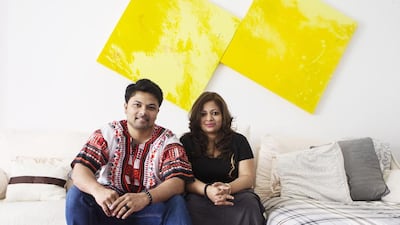Ashwin Pillai and Archana R D are partners in art and in life. The Indian husband and wife, who live in Abu Dhabi, have solo careers (under the names Ashvin and B’lu), but also work together, combining their ideas, disparate influences and common interests. The duo call themselves Henosis – the Greek expression for oneness.
How long have you been an artistic duo, and how did you get together?
Pillai: We met for the first time in 2011 at an art exhibition at Ghaf Art Gallery in Abu Dhabi. Our artworks happened to be placed side by side by the curator. Later, at an art event in Dubai where we were giving live art workshops, another artist suggested that we should paint together. So we tried it. In 2012, we began Henosis by bringing our completely different styles together on one canvas, and in 2015, we got married. We are perhaps known and appreciated for our portraiture of abstract realism in one single frame – marrying our distinct styles.
What prompted you to choose the name Henosis?
Archana: Henosis is the word for mystical union in classical Greek. It represents us completely, with the complexities and commonalities of two different artists. It is the physical extension of the amalgamated world of two dreamers, who wish to bring forth a new dimension of morphed reality. It is not limited to our artworks alone. We represent a progressive creative evolution and, as such, we launched THE (The Henosis Events) – a social-art movement – in 2014.
Who does what when you collaborate?
Pillai: Imagine any art collaborative output like making a movie – behind the scenes, there is a lot of collaboration at every level. Similarly for Henosis projects, we first finalise a story, then design it and then execute it with various media. Our works are a collective representation of our artistic enthusiasm. It is a process of constant challenge and growth – and we are addicted to it. Curators who know us independently and collectively say our works have tremendously changed. In their words, we are promising a new genre.
What are your general themes and inspirations as Henosis?
Archana: Henosis considers the entire cosmology of human experience and explores such themes as faith and religion, sexuality, race and identity, urban life, terrorism, superstition, war-related loss, ageing and death. War and peace seem to currently dominate our outer and inner worlds. Sometimes we select a fictitious theme to escape this. After all, art is a representation of everything we can physically extend through the artistic process.
Does the UAE inspire you?
Pillai: The UAE is a land of contradictions and continues to amaze us. We love the way the town management has planned the cities here, with special care to aesthetics and greenery. It is almost like they got a blank canvas and they drew up a dream. We love being a part of this dream. Our amazing home studio exists currently in Abu Dhabi. We are in proximity to professional art stores that stock everything we need. We have artist friends from all over the world, and it is the perfect example of how art simply thrives without borders. Though we are both from India, it is the UAE that brought us together, and hence it holds a very special place in our hearts.
Has working constantly with a partner forced you both to improve your own practice?
Archana: Yes. We both feel our individual styles have evolved dramatically after we started painting together. Our staple favourites of texturing oil with knife (B'lu) and abstract calligraphy-inspired forms (Ashvin) have got a new mental canvas. It is not wrong to say we inspire and challenge each other continuously. It is not unusual to see Ashvin holding a knife and myself dabbling with acrylics. We have broken into each other's comfort zones in a way that artists don't usually permit.
• For more information, visit www.artofhenosis.com
aseaman@thenational.ae

